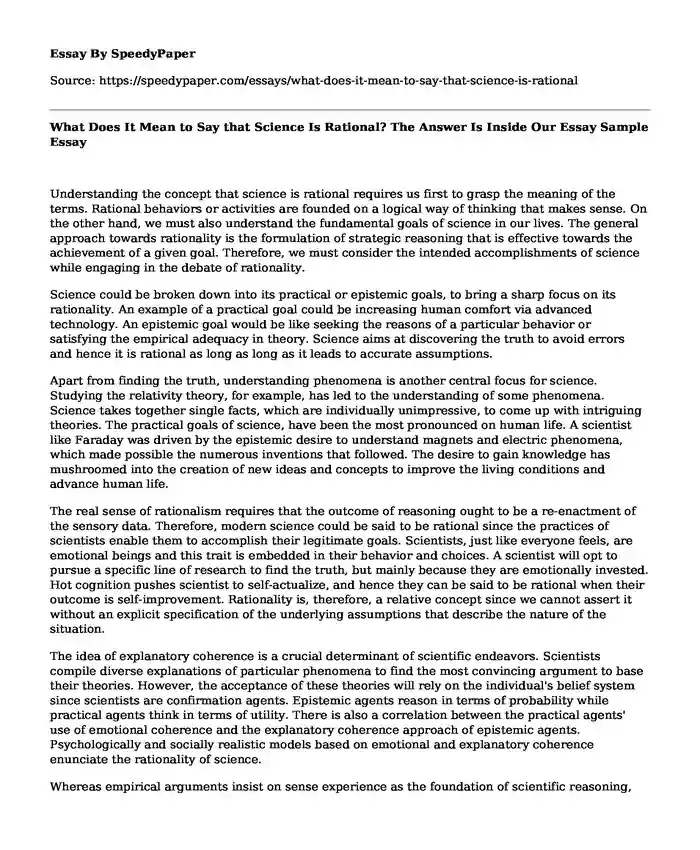Understanding the concept that science is rational requires us first to grasp the meaning of the terms. Rational behaviors or activities are founded on a logical way of thinking that makes sense. On the other hand, we must also understand the fundamental goals of science in our lives. The general approach towards rationality is the formulation of strategic reasoning that is effective towards the achievement of a given goal. Therefore, we must consider the intended accomplishments of science while engaging in the debate of rationality.
Science could be broken down into its practical or epistemic goals, to bring a sharp focus on its rationality. An example of a practical goal could be increasing human comfort via advanced technology. An epistemic goal would be like seeking the reasons of a particular behavior or satisfying the empirical adequacy in theory. Science aims at discovering the truth to avoid errors and hence it is rational as long as long as it leads to accurate assumptions.
Apart from finding the truth, understanding phenomena is another central focus for science. Studying the relativity theory, for example, has led to the understanding of some phenomena. Science takes together single facts, which are individually unimpressive, to come up with intriguing theories. The practical goals of science, have been the most pronounced on human life. A scientist like Faraday was driven by the epistemic desire to understand magnets and electric phenomena, which made possible the numerous inventions that followed. The desire to gain knowledge has mushroomed into the creation of new ideas and concepts to improve the living conditions and advance human life.
The real sense of rationalism requires that the outcome of reasoning ought to be a re-enactment of the sensory data. Therefore, modern science could be said to be rational since the practices of scientists enable them to accomplish their legitimate goals. Scientists, just like everyone feels, are emotional beings and this trait is embedded in their behavior and choices. A scientist will opt to pursue a specific line of research to find the truth, but mainly because they are emotionally invested. Hot cognition pushes scientist to self-actualize, and hence they can be said to be rational when their outcome is self-improvement. Rationality is, therefore, a relative concept since we cannot assert it without an explicit specification of the underlying assumptions that describe the nature of the situation.
The idea of explanatory coherence is a crucial determinant of scientific endeavors. Scientists compile diverse explanations of particular phenomena to find the most convincing argument to base their theories. However, the acceptance of these theories will rely on the individual's belief system since scientists are confirmation agents. Epistemic agents reason in terms of probability while practical agents think in terms of utility. There is also a correlation between the practical agents' use of emotional coherence and the explanatory coherence approach of epistemic agents. Psychologically and socially realistic models based on emotional and explanatory coherence enunciate the rationality of science.
Whereas empirical arguments insist on sense experience as the foundation of scientific reasoning, the achievements of science are beyond anything people could think of on their own. Relativity, evolution, electromagnetism, and other theories have come through constant questioning and tinkering by scientists. The numerous theories and inventions have led to a dramatic improvement in the living standards, and lifestyles of people thus proving that science is rational.
Cite this page
What Does It Mean to Say that Science Is Rational? The Answer Is Inside Our Essay Sample. (2022, Mar 04). Retrieved from https://speedypaper.com/essays/what-does-it-mean-to-say-that-science-is-rational
Request Removal
If you are the original author of this essay and no longer wish to have it published on the SpeedyPaper website, please click below to request its removal:
- Essay Sample Concerning Advocacy in Education
- Free Essay about Healthcare Law and Ethics
- Essay Example Dedicated to Samsung Company Limited: SWOT Analysis
- Free Essay about Everyday Use by Alice Walker
- Free Essay on the Prevention of Pregnancy Geared Toward Those Younger Than Age 18 Years
- Free Essay. Dunkin' Donuts Company: History and Introduction
- Free Essay: The Vaccine Debate
Popular categories





